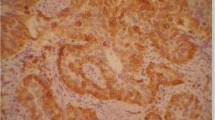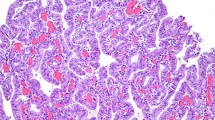Abstract
Classically, neoplasia has been considered to be primarily a disturbance in the regulation of proliferation, but it is now clear that programmed cell death is dysregulated as well as proliferation. The genes that are implicated in the regulation of these processes, such as p53, c-myc and bcl-2, are often also altered in neoplasms. We have studied proliferation and programmed cell death in hyperplastic polyps, adenomas, carcinomas in adenomas and adenocarcinomas of the colorectum, using the MIB-1 antibody which recognizes the Ki-67 proliferation related antigen, and an in situ nick-end labelling procedure for histochemical labelling of proliferating and apoptotic cells. In addition, immunohistochemistry was used to study the expression of the p53, c-myc and bcl-2 proteins. The material studied consisted of 12 samples of normal mucosa, 8 hyperplastic polyps, 39 adenomas with different degrees of dysplasia and including 3 that carried a carcinoma, and 10 adenocarcinomas, all formalin fixed and paraffin embedded. The Ki-67 index indicated that proliferation increased progressively in hyperplasia, through different degrees of dysplasia in adenoma, to reach the highest level (Ki-67 index of 50%) in adenocarcinoma. Apoptosis also increased in hyperplastic polyps and in adenomas, but decreased significantly in adenocarcinomas. p53 Labelling was seen in 77% of the carcinomas but in only 3% of the adenomas. Expression of c-myc increased in adenomas and carcinomas. Furthermore, a shift from predominantly nuclear to predominantly cytoplasmic expression was seen in progressive neoplasms. Expression of bcl-2 was increased in an occasional hyperplastic polyp, but was increased markedly in almost all adenomas. Strikingly, in the adenomas with a carcinoma, the carcinoma showed weaker bcl-2 expression than the adenoma. In 20% of the carcinomas some bcl-2 staining was seen but this was less extensive than in the adenomas. Our findings indicate that in the progression from adenoma to carcinoma both increased proliferation and decreased apoptosis occur. This is paralleled by an increased expression of p53 and an increased and predominantly cytoplasmic expression of c-myc, but a decreased expression of bcl-2. This decreased bcl-2 expression does not lead to an increase in apoptotic activity.
Similar content being viewed by others
Author information
Authors and Affiliations
Additional information
Received: 16 January 1997 / Accepted: 10 March 1997
Rights and permissions
About this article
Cite this article
Kikuchi, Y., Dinjens, W. & Bosman, F. Proliferation and apoptosis in proliferative lesions of the colon and rectum. Virchows Archiv 431, 111–117 (1997). https://doi.org/10.1007/s004280050076
Issue Date:
DOI: https://doi.org/10.1007/s004280050076




